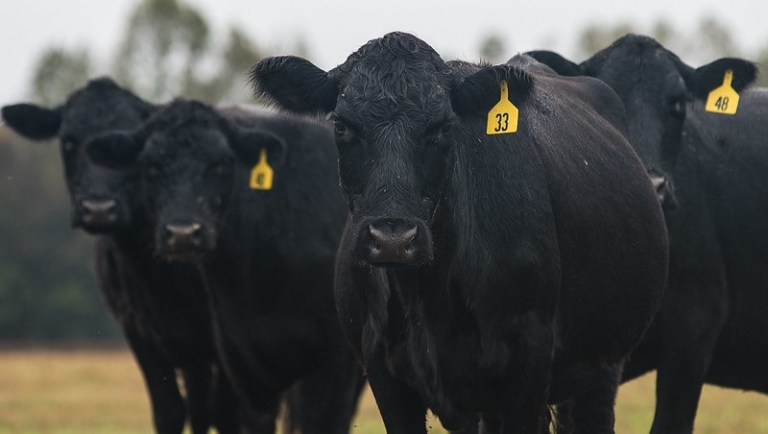Source – https://www.tsln.com/
During the Focusing on Fertility panel at the 137th Angus Annual Meeting, Kent Weigel, professor and chair of the Department of Animal and Dairy Sciences at the University of Wisconsin-Madison; Tom Lawlor, executive director of research and development at the Holstein Association, USA; and Kelli Retallick, director of genetic and genomic programs for Angus Genetics, Inc., discussed the importance of improving reproductive function for the Angus breed and the cattle industry and the role that haplotypes play in bovine fertility.
Haplotypes are alleles that are inherited as a group from a single parent. Through genomic testing, haplotypes that affect many traits can now be identified. In 2011, the dairy industry identified haplotypes that negatively affect fertility by causing embryonic loss. Using this research, AGI and the American Angus Association® have been studying haplotypes that affect fertility in the Angus breed.
Kent Weigel
Weigel began the discussion by addressing the importance of fertility and how research over the last 20 years has focused on improving fertility for the profitability of the operation. He provided the background and basic terminology surrounding haplotypes and highlighted their value in improving fertility.
Weigel shared how VanRaden and others identified five haplotypes that affect fertility in three breeds of dairy cattle in 2011. Researchers found that genomic testing provides shortcuts to finding lethal mutations that affect embryonic viability. Because embryos that inherit two copies of a lethal fertility haplotype from its parents are not carried to term, it is all about finding haplotypes with missing homozygotes.
“You can use a haplotype test many, many years in advance and they can provide a faster, albeit imperfect, way to manage potentially lethal defects more proactively,” said Weigel, as he concluded his presentation.
Tom Lawlor
Lawlor followed Weigel in the panel discussion where he focused on research that he has conducted at Holstein Association USA since 2011. The Holstein breed was one of the first to adopt genomic testing and discover haplotypes.
“The goal with genomic testing at the Holstein Association is to test and move our breed forward—NOT test and punish our association,” said Lawlor.
Lawlor shared how the Holstein breed turned haplotypes that impact fertility into a new class of genetic defects. He went into detail about the differences between genetic conditions and haplotypes. Fertility haplotypes tend have unseen problems; they occur before birth, have less of a financial loss and are less accurate.
Lawlor also stated, “We don’t want to simply eliminate families with these haplotypes and lose out on the genetic advantage they offer the breed.”
To properly manage fertility haplotypes, Lawlor shared how the Holstein Association has improved its communication and offered mating tools to help breeders more easily avoid carrier-to-carrier matings.
Kelli Retallick
Retallick concluded the panel as she shared what the Association is doing regarding haplotypes that affect fertility in Angus cattle. She emphasized how the Angus breed should learn from the dairy industry.
“When looking to the dairy industry, we learn that the Association needs an even larger database. These haplotypes affecting fertility occur at very low frequencies and genomic testing can help better manage haplotypes in herds,” said Retallick.
Retallick ended the Focusing on Fertility panel by addressing how haplotypes are a promising research endeavor. The AGI team knows that regions with missing homozygotes are present and that validating these regions would lead to additional opportunities to make genetic progress.
“As Angus breeders, you are uniquely positioned to leverage this type of research because of your dedication to growing the world’s largest single beef breed genomic database,” says Retallick.
Visit the American Angus Association YouTube channel, Angus TV, to watch the full Angus University webinar, Focusing on Fertility, and to subscribe for more educational content.
— Written by Whitney Whitaker, Angus Communications
